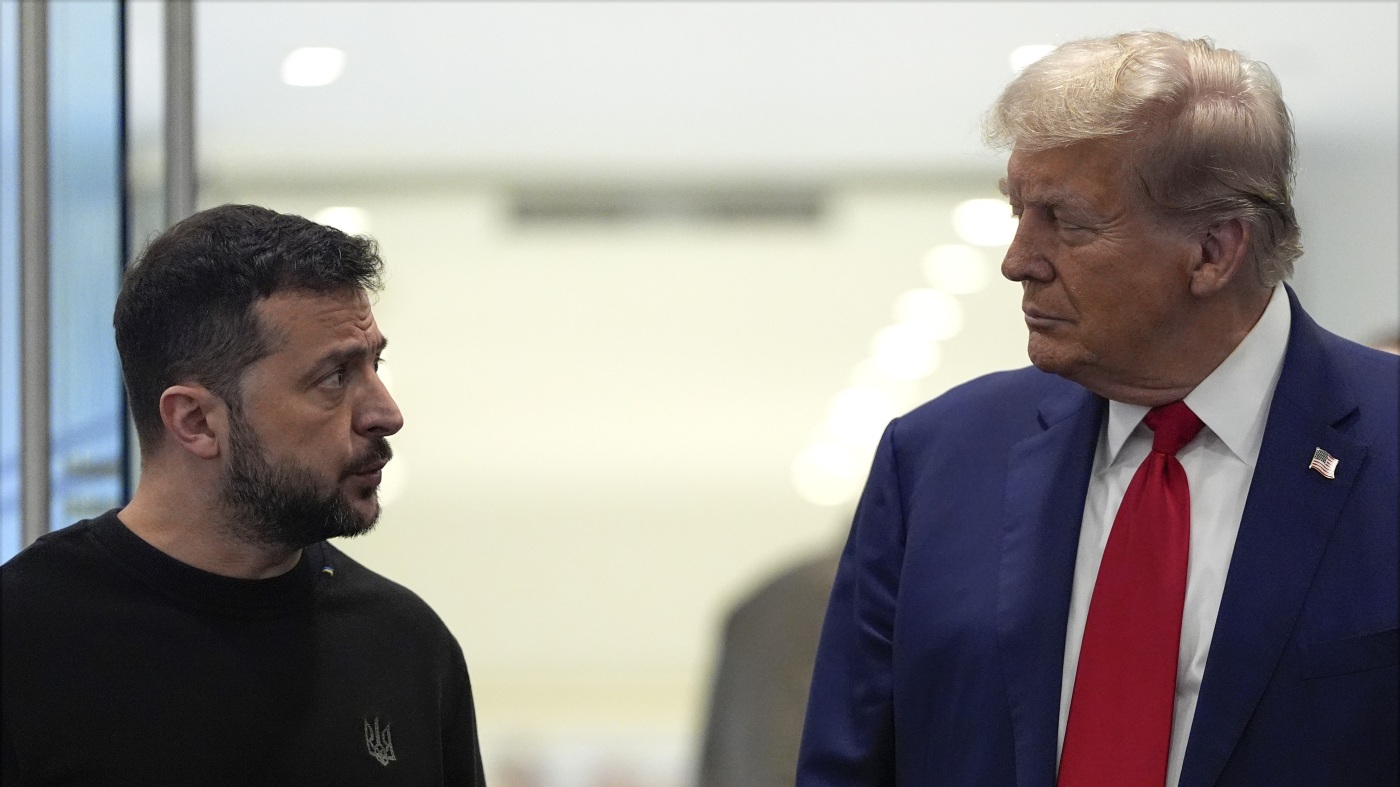What will Trump presidency mean for Russia’s war in Ukraine? : NPR

Then-candidate Donald Trump meets with Ukraine's President Volodymyr Zelenskyy at Trump Tower, on Sept. 27, in New York.
Julia Demaree Nikhinson/AP
hide caption
toggle caption
Julia Demaree Nikhinson/AP
KYIV — After Donald Trump’s resounding election win, Ukraine could lose the continued support of its most crucial ally, the U.S., which has spent $108 billion on military, humanitarian and economic aid to help Ukrainians since Russia's February 2022 invasion.
Trump has criticized the amount of aid for Ukraine and claims he will end the war in 24 hours, though he hasn’t elaborated how. Many Ukrainians do not trust Trump because of his professed admiration for Russian President Vladimir Putin, who wants to occupy Ukraine.
Trump has blamed Ukrainian President Volodymyr Zelenskyy, not Putin, for starting the war. Trump was also impeached in 2019 for pressing Zelenskyy to open criminal investigations into Joe Biden and his son Hunter for business dealings in Ukraine.
On Wednesday, Zelenskyy brushed all that aside and congratulated Trump, even speaking with him by phone in what he called an “excellent” conversation. Zelenskyy said he embraced what he called Trump’s “peace through strength” approach in global affairs.

“America and the whole world will definitely benefit from it,” Zelenskyy said in his evening video address. “People want certainty, they want freedom, a normal life. And for us, this is life without Russian aggression and with a strong America, with a strong Ukraine, with strong allies.”
The Kremlin, meanwhile, claimed it wasn't celebrating Trump’s victory, citing the U.S.’ ongoing assistance of Ukraine. Putin did not immediately congratulate him. “Let’s not forget that we’re talking about an unfriendly country that is both directly and indirectly involved in a war against our state,” Kremlin spokesman Dmitry Peskov said on Wednesday in his daily briefing with reporters.

Ukraine faces immense challenges as the war closes its third year. Its economy, strangled by war, is highly dependent on foreign aid. Russian forces are advancing on the eastern front line, joined by thousands of soldiers from North Korea, according to Ukrainian defense officials and the Pentagon. Russia strikes Ukrainian cities and towns every day with attack drones, ballistic missiles and glide bombs. Russian attacks have destroyed much of Ukraine’s energy grid, leaving millions vulnerable as winter approaches.

Not far from the eastern city of Pokrovsk, which is now under fierce Russian attack, soldier Maksym Sviezhentsev insists nothing Trump says suggests “his victory will bring anything good for us.”
“That is, only if we judge by nothing other than words,” Sviezhentsev told NPR by text message. “The reality is, we simply don’t know what will happen. Trump is unpredictable.”
The soldier says he’s focusing on keeping his crew warm, well-equipped and mentally prepared for battle against invading Russian troops.
“Whatever Trump does, we have no other choice but to fight the enemy,” he said.
Many Ukrainians fear Trump will force them to give up land occupied by Russia in exchange for ending the war. Vice President-elect JD Vance has promoted that idea, which is unpopular in Ukraine.
In Kyiv, 53-year-old Oksana Tsupii, who works in trade, says Ukrainians have already sacrificed so much to win back their territory.
“It’s difficult to look at the graves of our boys who have been killed, to think of all our cities Russia wiped off the face of the Earth,” Tsupii says. “But we are so small in this world of politics, and unfortunately, our lives are worth nothing.”
Solomiya Khoma of the Ukrainian Security and Cooperation Center, a think tank in Kyiv, says the U.S. remains Ukraine’s best chance at ending the war on its best terms. Other peace proposals from countries like China or Brazil “will lead to a temporary cessation of war, but not to the achievement of a lasting peace.”

Ukraine’s fight for survival became highly politicized last year, when congressional Republicans who support Trump blocked a $61 billion military aid package for several months, leaving Ukrainian soldiers short on weapons and ammunition on the front line, before the legislation eventually passed in April.

Since the beginning of Russia's full-scale invasion, Ukrainian lawmakers and business leaders have reached out to Senate and congressional Republicans for bipartisan support.
Oleksandr Kalenkov, who leads Ukrmetalurgprom, an association of Ukrainian companies involved in the metallurgical industry, said Ukraine respects the choice of the American people.
“And we have to deal with the outcome of this choice,” he said.
If the U.S. decides to decrease aid to Ukraine, Zelenskyy says the country will rely on itself and its European allies. European Union member states and institutions have spent more than $175 billion on aid to Ukraine since February 2022, according to the Kiel Institute for World Economy in Berlin.
In the meantime, President Biden has taken steps to “Trump-proof” some support for Ukraine before he leaves office.

In the summer, the Pentagon handed over control of military training and support to NATO. In September, Biden announced that remaining funds for Ukraine would be allocated by the end of his term, leaving no money for the next president's discretion. The U.S. is also part of a plan by the Group of Seven leading economies to provide a $50 billion loan to Ukraine using interest from Russian central bank assets frozen as part of sanctions. The U.S. will provide $20 billion of that total, getting the money out before Trump's inauguration.
Ukrainians are also hoping Biden might finally lift U.S. restrictions on Ukraine using advanced long-range weapons supplied by the West to hit military targets deep inside Russia. The White House says this would escalate the war. Ukrainians say the move would help them protect themselves.
NPR producer Polina Lytvynova contributed reporting from Kyiv.
Source link





